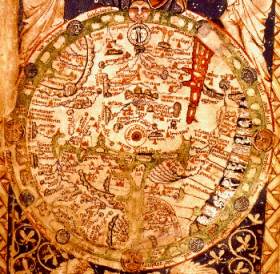The Description of the Universe is Subjective
 |
We were working on the Spanish words that describe human senses. That day his behavior had changed. He was interested in all the senses except one sight. The other anomaly was that he was not interested in the modern version of the words; he was asking for its old Spanish version.
After a comprehensive cross-examination, he confessed he had deserted the study of the Argentine society. An old book found in the National Library opened to him the possibility of a general study of any society.
"Come on, James," said I. "We already agreed that the only difference between societies stems from its distinct history."
"No, no, no! This is different," he answered. "They used different senses! They were blind! I have the description in this old Spanish book!"
"I want to see it!" I said.
"No!" he replied sitting on it. "I want your help, not your interpretation." Then he started drawing a map of the place ...
(The description of the universe is subjective, and we are the center of it.)
Some weeks ago when I was in the US browsing in Barnes & Noble's bookstore, I saw a map in a book by Toynbee, and it was almost identical to what James drew many years ago. How could that be possible? Toynbee's was a thirteenth century map of the world as it was known in medieval times. Toynbee's medieval map was encircled by the sea. The map drawn by James of the blind society was ringed by a channel used to irrigate the whole valley. The roads crossed the valley in a perfect geometry on the side of irrigation channels in the same way that in the old map buildings were connected by rivers and roads. If we changed the units of measurement, the old medieval map found in Barnes & Noble could represent both worlds.
James continued his explanation. "Of course, the blind society was very different from any other society including ours, though very knowledgeable and prosperous. Their senses were impressively acute. They could judge the slightest gesture of a man many feet away. They could hear every beating of his heart. Intonation replaced facial expression, and touches replaced gestures. Their sense of smell was so extraordinary that they could distinguish individual differences better than a dog. They called the day night and the night day, because they rested when it was warm and worked when it was cool.
(The description of the universe is subjective, and we are the center of it.)
"They used a mathematical theory that allowed them to stroll fast in the complex geometry of the roads. Its angles were announced by special notches in the curbs, and the surface of the roads was loaded with information about everything law, prayers, etc."
James's description was not only physical, but also spiritual. "In the apex of their science was God, the pure spiritual almighty being, untouchable, unsmellable, unhearable. Below God where the angels, those quasi spiritual beings that could only be heard not touched. Some mystics called them birds, also, and assured that they could touch them, although very rarely. But that was still under debate."
James went on describing the clean houses with unpredictable colors...
"Stop James," I said. "Your description of their world wouldn't make any sense to them."
"Right," James said, "in fact, they conceived the sky as a lid of rock that covered their cosmic casserole over which was the smooth roof of the universe. We can safely say that their scientists were at least as clever as ours, but they could never, ever, describe the universe as we do. "Even more," continued James, "if we had only one more sense, our description of the universe would be absolutely different, also, because The description of the universe is subjective, and we are the center of it."
When I hear of discoveries of new stars, quasars, and the like, I can't help remembering this episode as a cold skepticism invades my soul. Good for our scientist that are busy trying to expand the limits of the known universe, but aren't they only working the details of that old medieval map, perhaps changing only its scale? James convinced me that after all, the description of the universe is subjective, and we are the center of it.